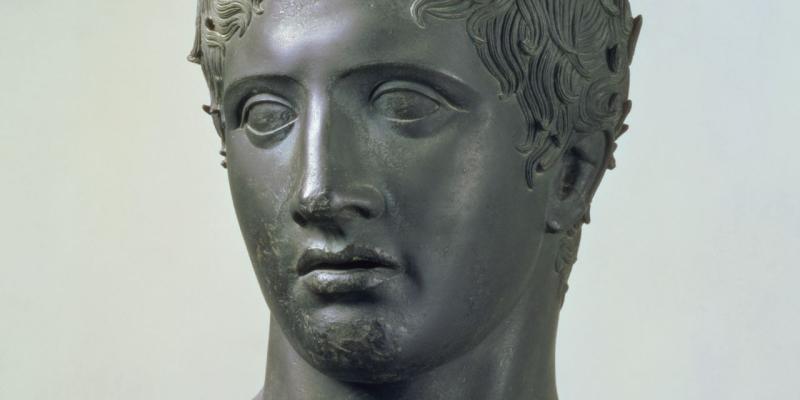'Demetrius' Review: Aiming for Empire -
By: Peter Thonemann (WSJ)



Nominations, please, for the title of Most Confusing Historical Period Ever. The third-century crisis of the Roman Empire? The Thirty Years' War? The Balkans, pretty much whenever? Kids' stuff. The half-century after the death of Alexander the Great still beats all comers.
After Alexander's death in Babylon in 323 B.C., his vast empire, stretching from the Adriatic to the Indus, was engulfed in a head-spinning series of civil wars between a huge cast of Macedonian generals, all of whom seem to be married to everyone else's sister. By the end of the 280s B.C., three major successor dynasties (the Ptolemies in Egypt, the Seleucids in the Near East, and the Antigonids in Macedon) had finally emerged from the carnage. But the intervening period was, frankly, a nightmare.
Among the dozen or so grim-faced warlords who fought over Alexander’s legacy, by far the best-known to us is the mercurial Demetrius Poliorcetes (“City-Besieger”). Demetrius probably never met his great predecessor—he was only a toddler when Alexander set out for Asia—but none of Alexander’s successors came so close to reincarnating the conqueror’s spirit. In “Demetrius: Sacker of Cities,” James Romm draws a concise and engaging biographical portrait of this extraordinary man.
Demetrius was the son of the Macedonian general Antigonus the One-Eyed, the most ruthless of Alexander’s early successors, who built a short-lived personal empire in modern Turkey and Syria. Already in his 60s at the time of Alexander’s death, Antigonus was an old man in a hurry. At the age of 19, Demetrius was leading his father’s Companion Cavalry in battle, and when Antigonus took the title “King” in 306 B.C., Demetrius was proclaimed as co-ruler.
Demetrius’ nickname derived from his spectacular siege operations, most famously deployed during his year-long siege of the island city of Rhodes in 305–04 B.C. His first empire collapsed overnight after Antigonus’ defeat and death at the battle of Ipsus in 301, but with phenomenal speed Demetrius won a new kingdom for himself, this time in Macedon and mainland Greece. His second empire was equally short-lived. In 286 B.C., a quixotic attempt to imitate Alexander’s heroic march into Asia descended into farce, and Demetrius died soon afterward of gluttony and alcoholism, imprisoned in a remote Syrian fortress.
Much of what we know of Demetrius’ life and personality comes from Plutarch’s sparkling and melodramatic biography, written some 350 years after Demetrius’ death. Most of the entries in Plutarch’s “Parallel Lives” deal with figures of exemplary virtue; his “Life of Demetrius” (along with its Roman parallel, the equally over-the-top “Life of Antony”) instead explores the effects of self-destructive vice. Plutarch paints an irresistible picture of Demetrius’ physical beauty, courage and charisma but also his immense and indiscriminate sexual appetite, his heavy drinking, and his increasingly unhinged megalomania. Perhaps some of this is a bit overdrawn—or shaped by Plutarch so as to draw out the analogies with Mark Antony—but it is all enormous fun. Puccini could have made a terrific opera out of it.
Mr. Romm has long been one of the most energetic interpreters of ancient Greek history for a nonspecialist readership. He has tackled the wars of Alexander’s successors before, in his lively and accessible “Ghost on the Throne” (2011), to which his biography of Demetrius is (as it were) a worthy successor. Mr. Romm knows how to tell a story, and “Demetrius: Sacker of Cities” rattles along at a terrific pace; his narrative of the epic siege of Rhodes is the most exciting I have ever read. For all his evangelical zeal, Mr. Romm does occasionally vent his frustration with the Habsburg-like tangle of overlapping marriage-alliances: “A curse on these repurposed names!” he writes at one point, as he wrestles with yet another of the period’s four Alexanders, four Ptolemies and three Demetriuses. Nonetheless, it is hard to imagine a more lucid account of the fiendish political history of the period.
Mr. Romm’s handling of cultural history is less sure-footed. One striking novelty of this period is the emergence of the ruler-cult—the worship of living generals and kings as gods by Greek city-states. Thanks to Plutarch’s account, and an extraordinary surviving Athenian cult-hymn to Demetrius, we know more about the worship of Demetrius than of any other early Hellenistic ruler. “Hail,” sang the Athenians, “son of the most powerful god Poseidon and of Aphrodite! For other gods are far away, or do not have ears, or don’t exist, or take no notice of us, but you we see present here, not made of wood or stone, but real: so we pray to you.”
These cults, for Mr. Romm, are nothing but “infatuation” and “self-abasement”: The hymn to Demetrius shows “how low Athens had sunk,” and Athenian politicians cynically promoted the worship of Demetrius “in order to bolster their own political futures.”
But there is surely more to it than that. Throughout the Greek world and Roman Empire, the cult of living rulers continued down to the fourth century A.D. and was treated with immense seriousness by participants; the ruler-cult was as central to the legitimacy of Hellenistic kings and Roman emperors as the divine right of kings was to Christian Europe. We may not like the ruler-cult much, but to dismiss a social institution that endured for more than 600 years as nothing more than contemptible flattery doesn’t make for terribly good history.
It should be said that Mr. Romm’s publisher hasn’t served him especially well. The subtitle “Sacker of Cities” is, at best, dodgy marketing: Demetrius besieged dozens of cities but sacked only one (Babylon). The absence of plates is a major missed opportunity: The official portraiture of Demetrius, in sculpture and on coins, is a glorious seam of contemporary evidence for his Alexander-like public persona. Still, for anyone new to this tangled but thrilling period of history, Mr. Romm’s whirlwind Demetrius is now the place to start, though be warned: Trying to master the marriage alliances between Ptolemy and Lysimachus may bring on a migraine.
Mr. Thonemann teaches Greek and Roman history at the University of Oxford.

Who is online
337 visitors

